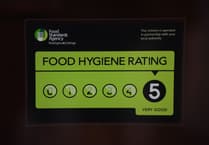CONTROVERSIAL new recycling rules are impractical and will hit businesses across Monmouthshire with significant costs, its MP has warned.
From 6 April, workplace refuse must be separated as part of Welsh Government legislation aimed at improving the quality and quantity of recycling in a bid to reach zero waste.
But Monmouth MP David Davies has been contacted by several business owners who believe the changes come with “real practical issues” that have either been “dismissed or not considered”.
These include concerns about fly-tipping, vermin infestation, lack of space for storing additional bins, and multiple collections.
Sophie Bensley owns a specialist cook shop in Abergavenny and said the new regulations have left businesses “wondering what will happen next”.
“I am astounded at how short-sighted Welsh Government have been in the consultation process. If only Julie James (Minister for Climate Change) and her team had asked retail businesses, they would have learnt very quickly that this new legislation is a nonstarter.
“I clearly understand the need for recycling - we have lobbied our suppliers for many years to stop using single use plastics - and I understand we all need to do more for climate change. But I really do not believe this is the way to go about it as all our waste is already sorted by our waste management company and recycled.”
Mr Davies visited Cooks Galley in Nevill Street to meet Ms Bensley. He said there was a lot of anger that the business community will carry the “burden of cost” for the Labour Welsh Government’s “drastic” workplace recycling rules.
“When this policy comes into force, businesses will not be allowed to have a mixed recycling bin or collection – which means they have to incur significant costs to manage additional bins for each separate waste type,” said Mr Davies.
“The costs could run into thousands of pounds and is a burden most businesses do could without in the current economic climate. Indeed, there are concerns these costs will lead to the possible closure of small businesses already struggling with rising overheads.
“There are also questions over where these additional bins are going to be stored and how often the additional bins be emptied? The wheelie bin at Cooks Galley is currently emptied once a week on a Monday morning. But if two, three or even four separate bins are needed, different lorries are going to be queuing up to gain access to the town centre for multiple collections.”
Tim Strong, director of the Glen-yr-Afon House Hotel in Usk, is another customer of Thomas Waste Management. He told Mr Davies the workplace segregation legislation needs to be stopped and re-thought out properly “by somebody with a greater understanding of the needs and costs involved”.
“We already re-cycle glass, cardboard, metal and plastic and have done for many years at a cost to the business,” said Mr Strong.
“Our general waste contains some food, peelings, and contaminated packaging. The new proposals mean any food business that produces more than 5kg of food waste per week must make separate arrangements for food recycling.
“We have been unable to find a solution to this for our food waste requirements, so are unsure where that will leave us and many other food businesses in the same boat.
“This policy has quite obviously been dreamt up by somebody who has absolutely no idea how a commercial pub, restaurant, café, or hotel operates and indeed I would suspect has never worked in one.
Mr Davies added he would be writing to Climate Change Minister Julie James on behalf of Monmouthshire businesses to explain the impact of the new regulations.




